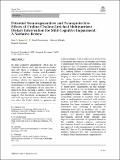| dc.contributor.author | Baumel, Barry S. | |
| dc.contributor.author | Doraiswamy, P. Murali | |
| dc.contributor.author | Sabbagh, Marwan | |
| dc.contributor.author | Wurtman, Richard Jay | |
| dc.date.accessioned | 2021-01-11T18:44:28Z | |
| dc.date.available | 2021-01-11T18:44:28Z | |
| dc.date.issued | 2020-12 | |
| dc.date.submitted | 2020-11 | |
| dc.identifier.issn | 2193-8253 | |
| dc.identifier.issn | 2193-6536 | |
| dc.identifier.uri | https://hdl.handle.net/1721.1/129370 | |
| dc.description.abstract | In mild cognitive impairment (MCI) due to Alzheimer disease (AD), also known as prodromal AD, there is evidence for a pathologic shortage of uridine, choline, and docosahexaenoic acid [DHA]), which are key nutrients needed by the brain. Preclinical and clinical evidence shows the importance of nutrient bioavailability to support the development and maintenance of brain structure and function in MCI and AD. Availability of key nutrients is limited in MCI, creating a distinct nutritional need for uridine, choline, and DHA. Evidence suggests that metabolic derangements associated with ageing and disease-related pathology can affect the body’s ability to generate and utilize nutrients. This is reflected in lower levels of nutrients measured in the plasma and brains of individuals with MCI and AD dementia, and progressive loss of cognitive performance. The uridine shortage cannot be corrected by normal diet, making uridine a conditionally essential nutrient in affected individuals. It is also challenging to correct the choline shortfall through diet alone, because brain uptake from the plasma significantly decreases with ageing. There is no strong evidence to support the use of single-agent supplements in the management of MCI due to AD. As uridine and choline work synergistically with DHA to increase phosphatidylcholine formation, there is a compelling rationale to combine these nutrients. A multinutrient enriched with uridine, choline, and DHA developed to support brain function has been evaluated in randomized controlled trials covering a spectrum of dementia from MCI to moderate AD. A randomized controlled trial in subjects with prodromal AD showed that multinutrient intervention slowed brain atrophy and improved some measures of cognition. Based on the available clinical evidence, nutritional intervention should be considered as a part of the approach to the management of individuals with MCI due to AD, including adherence to a healthy, balanced diet, and consideration of evidence-based multinutrient supplements. | en_US |
| dc.publisher | Springer Science and Business Media LLC | en_US |
| dc.relation.isversionof | http://dx.doi.org/10.1007/s40120-020-00227-y | en_US |
| dc.rights | Creative Commons Attribution | en_US |
| dc.rights.uri | https://creativecommons.org/licenses/by/4.0/ | en_US |
| dc.source | Springer Healthcare | en_US |
| dc.title | Potential Neuroregenerative and Neuroprotective Effects of Uridine/Choline-Enriched Multinutrient Dietary Intervention for Mild Cognitive Impairment: A Narrative Review | en_US |
| dc.type | Article | en_US |
| dc.identifier.citation | Baumel, Barry S. et al. "Potential Neuroregenerative and Neuroprotective Effects of Uridine/Choline-Enriched Multinutrient Dietary Intervention for Mild Cognitive Impairment: A Narrative Review." Neurology and Therapy (December 2020): dx.doi.org/10.1007/s40120-020-00227-y © 2020 The Author(s) | en_US |
| dc.contributor.department | Massachusetts Institute of Technology. Department of Brain and Cognitive Sciences | en_US |
| dc.relation.journal | Neurology and Therapy | en_US |
| dc.eprint.version | Final published version | en_US |
| dc.type.uri | http://purl.org/eprint/type/JournalArticle | en_US |
| eprint.status | http://purl.org/eprint/status/PeerReviewed | en_US |
| dc.date.updated | 2020-12-27T05:07:17Z | |
| dc.language.rfc3066 | en | |
| dc.rights.holder | The Author(s) | |
| dspace.embargo.terms | N | |
| dspace.date.submission | 2020-12-27T05:07:17Z | |
| mit.license | PUBLISHER_CC | |
| mit.metadata.status | Complete | |
